This article has multiple issues. Please help improve it or discuss these issues on the talk page . (Learn how and when to remove these template messages)
|
Elena Ledda (born 17 May 1959 in Selargius) is an Italian singer from Sardinia. [1]
This article has multiple issues. Please help improve it or discuss these issues on the talk page . (Learn how and when to remove these template messages)
|
Elena Ledda (born 17 May 1959 in Selargius) is an Italian singer from Sardinia. [1]
Born near Cagliari, Ledda pursued conservatory studies in oboe and voice.
Her soprano voice was suitable for opera, which she performed early in her career, but she was attracted by the folk singing of her native Sardinia and eventually recorded primarily in that genre. She worked with Cooperativa Teatro di Sardegna in the late 1970s and has toured and recorded internationally.
She was chosen by Sardinian movie director, Gianfranco Cabiddu, to be the leading voice for his live music/cinematic mix project, Sonos de Memoria, featuring film footage of Sardinia from the 1930s and leading contemporary Sardinian musicians playing over the film. Sonos toured the world with other Sardinian musicians such as Paolo Fresu.
In 2006, Ledda participated in Visioni di Sardegna, written and produced by her longtime collaborator Mauro Palmas, who restored film footage of Sardinia from the Luce Institute, and assembled 18 musicians under the direction of RAI TV director, Rodolfo Roberti. Greek singer Savina Yannatou was invited to feature in the project.
Her collaboration with Savina Yannatou resulted in a series of ten concerts at the Half Note club in Athens at the end of March 2006. This met with critical acclaim and TV interest in Greece, and resulted in a CD (Tutti Baci, Lyra 1095) also featuring Mauro Palmas and Primavera en Salonico.
Ledda's collaborators have included Lester Bowie, Israeli singer Noa, Maria del Mar Bonet (Mallorca), Paolo Fresu, Andreas Vollenweider, Don Cherry, and Nana Vasconcelos. In 2005 Elena collaborated with Neapolitan violinist, Lino Cannavacciuolo (Peppe Barra's violinist and original founder of the Solis String Quartet, now Noa's band of choice) to produce her CD Amargura.
The BBC's Andy Kershaw said of Ledda, "I planned a trip south to make a program about Sardinian music, almost solely on the evidence of a CD I was given of Elena's voice. We went to Sardinia and I was blown away. Elena and her band make traditional music from Sardinia using all the mainstream instruments, with hardly any 'traditional Sardinian' instruments in sight, yet it sounds so traditional and so not-mainstream. They have achieved a truly unique and refreshing sound. Clearly rooted to Sardinian tradition, yet so modern." [2]
A 2007 recording was done with Andrea Parodi, who died before completing the work. Ledda sang at Parodi's funeral.
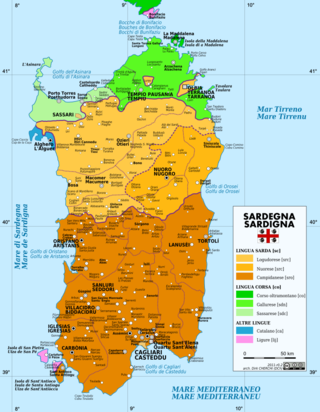
Sardinian or Sard is a Romance language spoken by the Sardinians on the Western Mediterranean island of Sardinia.
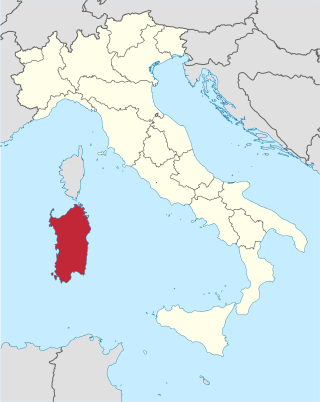
Sardinia is the second-largest island in the Mediterranean Sea, after Sicily, and one of the 20 regions of Italy. It is located west of the Italian Peninsula, north of Tunisia and immediately south of the French island of Corsica.
Sardinia is probably the most culturally distinct of all the regions in Italy and, musically, is best known for the tenore polyphonic singing, sacred chants called gosos, the launeddas, an ancient instrument that consists of a set of three single-reed pipes, all three mouth-blown simultaneously using circular breathing, with two chanters and one drone and the cantu a chiterra, a monodic song that is accompanied by guitar, widespread mainly in the center and north of the island.

Folk Songs is a song cycle by the Italian composer Luciano Berio composed in 1964. It consists of arrangements of folk music from various countries and other songs, forming "a tribute to the extraordinary artistry" of the American singer Cathy Berberian, a specialist in Berio's music. It is scored for voice, flute, clarinet, harp, viola, cello, and percussion. The composer arranged it for a large orchestra in 1973.
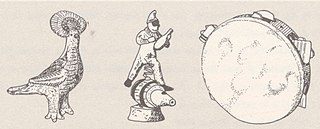
Italian folk music has a deep and complex history. National unification came quite late to the Italian peninsula, so its many hundreds of separate cultures remained un-homogenized until quite recently. Moreover, Italian folk music reflects Italy's geographic position at the south of Europe and in the center of the Mediterranean Sea: Celtic, Slavic, Arabic, Greek, Spanish and Byzantine influences are readily apparent in the musical styles of the Italian regions. Italy's rough geography and the historic dominance of small city states has allowed quite diverse musical styles to coexist in close proximity.

Maria Carta was a Sardinian folk music singer-songwriter. She also performed in film and theatre. In 1975 she wrote a book of poetry, Canto rituale.
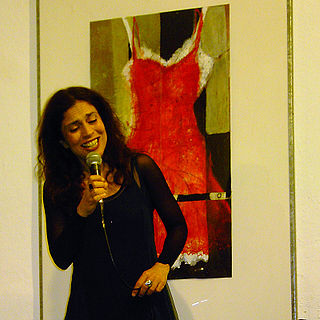
Savina Yannatou is a Greek singer.

The Nuragic civilization, also known as the Nuragic culture, was a civilization or culture on Sardinia (Italy), the second largest island in the Mediterranean Sea, which lasted from the 18th century BC up to the Roman colonization in 238 BC. Others date the culture as lasting at least until the 2nd century AD and in some areas, namely the Barbagia, to the 6th century AD or possibly even to the 11th century AD.

The Sardinians, or Sards, are a Romance language-speaking ethnic group native to Sardinia, from which the western Mediterranean island and autonomous region of Italy derives its name.

Sardinian nationalism or also Sardism is a social, cultural and political movement in Sardinia calling for the self-determination of the Sardinian people in a context of national devolution, further autonomy in Italy, or even outright independence from the latter. It also promotes the protection of the island's environment and the preservation of its cultural heritage.
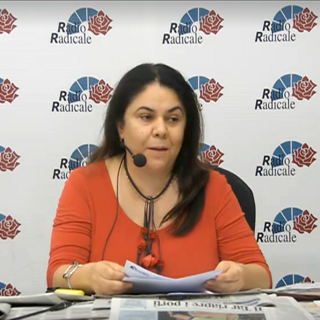
Michela Murgia is an Italian novelist, playwright and radio personality. She is a winner of the Premio Campiello and the Mondello International Literary Prize.
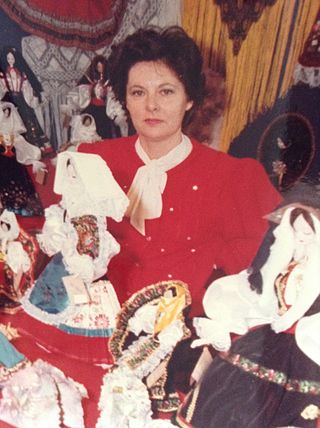
Vittoria Valmaggia was an Italian artist. Known also as Rina Conforti or Tappin, she was a ceramist, painter, stylist and the first Sardinian artist to produce dolls in traditional costumes combining multiple fabrics, gold and silver miniature jewellery, copper and ceramics.

Roberto Tola is an Italian jazz guitarist and composer.
Su patriotu sardu a sos feudatarios, widely known also by its incipit as Procurade 'e moderare, is a protest and antifeudal folk song in the culture of Sardinia.
Filomena Campus is a jazz singer, composer, lyricist, academic and theatre director, who was born in Sardinia and since 2001 has been based in London, England. Her performance style characteristically fuses jazz, theatre and literature, and she is the founder of the company Theatralia, curating the annual Theatralia Jazz Festival in collaboration with the PizzaExpress Jazz Club in Soho, with the aim of uniting British and Italian styles.
The Deus ti salvet Maria is a devotional song belonging to the Sardinian tradition of the Gosos, written in Sardinian language in the 18th century by the poet Bonaventura Licheri . The lyrics were translated around 1725; the oldest transcription is the one of Maurizio Carrus, who had inserted it as an appendix in the Rosary of San Vero Milis in 1731. The Laude is sung in the form of the gosos, a typical devotional song widespread in Sardinia.
A Diosa is a song written in 1920 by the composer Giuseppe Rachel with the time of English Waltz, on the words of the homonymous poem in Logudorese language, written in 1915, by the lawyer Salvatore Sini. Since 1921 the song was part of the repertoire of the "Philharmonic Body" of Nuoro, directed by Rachel himself. In 1936 the tenor Maurizio Carta recorded in a 78 rpm, for the Pathé Records, three verses of A Diosa . In 1957 in Turin, on the initiative of the musician and musicologist Gavino Gabriel, a version of the Coro di Nuoro was recorded. In 1978 Maria Carta recorded the piece in a 45rpm for the Polydor Records.
Shigeaki Sugeta is a Japanese linguist. Emeritus professor of General, Romance and Italian Linguistics at the University of Waseda, and now advisor to the Institute of Italian Studies of the same university, is the author of the first ever Sardinian-Japanese vocabulary.

Istentales is a Sardinian ethnic pop-rock band. The group was formed in Sardinia in 1995 in Nuoro in Sardinia by Gigi Sanna.